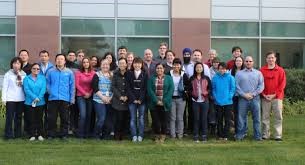The Fiehn research laboratory develops improved methods in analytical chemistry and bioinformatics to capture and utilize metabolomic data. These tools are employed to understand, which parts of larger biochemical networks respond to genetic perturbation or environmental stress.
Untargeted metabolomics by LC-accurate mass MS/MS analysis
Using targeted assays, e.g. by LC-QTRAP mass spectrometers, yields high confidence data on a range of metabolites from different biochemical pathways. However, this view assumes we already know everything there is to know about cellular and physiological metabolism! This assumption is certainly false. We routinely detect hundreds of novel metabolic signals in liquid chromatography-mass spectrometry profiling. Unlike gas chromatography, such LC-based methods are much more selective in terms of the compounds that can be seen in any specific method. For example, our lipidomic assays (see Core Services) have been implemented as routine tools for blood plasma or blood serum analysis, detecting over 600 identified complex lipids from a range of different lipid classes. However, such method is blind for hydrophilic compounds, including compounds that are critical in cardiovascular diseases (e.g. carnitine, creatinine, choline, betaine), gut microbial metabolites (such as sulfates) or polysaccharides and glucuronidated metabolites. Many transformations are carried out by mammalian endogenous enzymes due to substrate (or reaction) unspecificity, and, equally important, many biochemical reactions are performed by microbes living within the human super-organism. In addition, humans eat plants.... All such biochemicals can therefore be found as 'unknowns' in LC-MS or GC-MS profiling scans, and these compounds are certainly not yet covered by databases like HMDB or KEGG.
We therefore engage with interested biological or clinical scientists to develop LC-methods, including sample preparation, to better address this chemical complexity. We use a range of different columns, including hydrophilic interaction chromatography, to look for polar compounds; we devise novel ways to acquire and process such complex MS and MS/MS data, and we test different mass spectrometers in conjunction with instrument vendors. These projects should lead to collaborative research papers and NIH grant submissions.
If interested, please contact Professor Oliver Fiehn (ofiehn@ucdavis.edu) for more information, and visit the Fiehn research website.
Fiehn research and WCMC service core lab
12 LCMS instruments
2x Agilent 6530 QTOF mass spectrometer
1x Agilent 6550 QTOF mass spectrometer
1x Sciex QTRAP 6500 mass spectrometer
1x Sciex Triple TOF mass spectrometer
4x ThermoFisher Orbital ion trap MS mass spectrometers
1x ThermoFisher ion trap LTQ mass spectrometer
2x ThermoFisher Altis triple quadrupole mass spectrometers
1 Bruker timsTOF mass spectrometer with Bruker UHPLC
6 GCMS instruments
1x Agilent GC-QTOF mass spectrometer for chemical or electron ionization
5x LECO Pegasus III, IV and BT GC-time of flightmass spectrometers
Staff

Director: Oliver Fiehn, PhD, Professor (Molecular and Cellular Biology, Genome Center, College of Biological Sciences at UC Davis)
Current Fiehn research lab members
